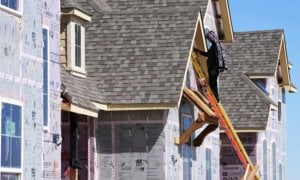Best may not get her chance for a while yet. In Toronto and, Canada’s other ultra-hot market, Vancouver, the dream of property ownership feels increasingly out of reach, while sellers’ returns seem like lottery prizes. In fact, home prices all over Canada continued to rise this year: as of January 2022, they were up 21% from the same month the previous year. There’s an ongoing national housing imbalance, with resales reaching record highs while inventory levels plummet to record lows, according to the Bank of Canada.
Given the pride that Canadians take in property ownership—and the natural desire to achieve cultural milestones, home ownership being one of the biggest—getting into the housing market can be highly emotional. For people currently renting who want to own, this may be compounded by a strong desire to stop forking over rent money and start building personal equity.
Unattainable housing and social pressue, combined with the data showing that residential real estate has produced higher returns than the stock market over the last 20 years, can make not buying a home seem like a missed financial opportunity. Enter: the nagging sense of real estate FOMO—a feeling that could motivate you to make the wrong financial choices, if left unchecked.
The effect of real estate FOMO
Real estate FOMO could explain some of the financial measures Canadians are taking to get onto the property ladder—like borrowing from parents, referred to as using the Bank of Mom and Dad. A report from IG Private Wealth Management released in 2021 found that among Canadian households with at least $1 million in investable assets, the average gift size from parents who had given or planned to give their children money to put towards a first-home down payment was $145,000.
Watch: What is mortgage affordability?
Borrowing from unconventional lenders, like private lenders, is another strategy—one with a steep cost. “Unfortunately, there are people willing to give you money—at an exorbitant rate,” says Rajit Khanna, a financial advisor with Edward Jones. He points to loans with interest rates of 10% to 12%. “That’s like using a credit card to buy a house.”
In order to get a foot into the door, buyers are also agreeing to longer amortization periods or making smaller down payments in exchange for having to pay mortgage insurance.
What to consider before you buy into real estate FOMO
With these kinds of inhospitable conditions for buyers, and evidence suggesting that the Canadian housing market could be headed for a correction, is the Canadian real estate market still a good investment? Here’s what you should know before you let your fear of missing out drive you to make an unwise investment buying in.
Real estate losses aren’t impossible
Conventional wisdom has it that real estate always appreciates, but that’s not the case, even in the current seller’s market. Although Canadian housing prices have appreciated significantly over the past 20 years, Daniel Tersigni, a portfolio manager at Wealthsimple, says that gains in home values are not a guarantee; losses—even large ones—are always possible. Tersigni points to historic examples, like the decline in U.S. housing prices that occurred from 2006 to 2012, as well as a steep decline in Canadian housing prices in the 1990s. “Prices peaked in 1989 and didn’t fully recover until 2003 after accounting for inflation,” he says.
And with interest rates set to rise, Rajit Khanna of Edward Jones says the market could moderate itself. “Patience is not a bad thing at this point in time,” he says.












To deny the ongoing rise in land prices or building prices is to deny the geography of Canada (very little livable land), deny Canadians love affair with farm land (to be preserved above all else and severely restrict housing land supply), to deny the Canadian “gold” plated building standards, making building cost 25% more without quantifiable benefit, and deny the ever increasing rise in Government tax/fees for home construction; got to pay for the health care somehow. So costs out of control in the wrong direction.
To deny income reduction in real terms is to deny the TDS ratio commitment of income for the mortgage required to get into the Canadian market (used to be 50%-60% but is now 30%-40%).
These are the only factors that have changed. Restricted supply and less willingness to commit money = “UN-affordability”. Demand is purely about Canadian population increase. It is not about FOMO or Foreigners. The cost of housing will never be as low as it is now. Get into dept with no safety net; but get in now.
Prices may go down for a very short period (3 years in Calgary was I believe the record) but over your lifetime will always be up. For the last 40 years, population and the cost of housing development are always increasing at a rate higher than the GDP in Canada – successive Canadian Governments saw to that, and there is no indication that their policies will change.
“Although Canadian housing prices have appreciated significantly over the past 20 years…”
This is true, and probably also true that over the long term real estate will increase in value. But….
Comparisons to other investments need to be equivalent: net of all holding and transaction costs – interest, mortgage and property insurance, utilities, maintenance, discretionary furnishings and improvements, legal and real estate fees, taxes, commuting, and on and on.
Comparing to the Nasdaq or S&P500 rather than the S&P TSX (as the referenced report does) probably yields a different picture.
Appreciation is only relevant once you cash in, so you’re always making a bet about what future conditions will be, and only versus the opportunity cost of devoting your time, money, and other resources into a house versus elsewhere.